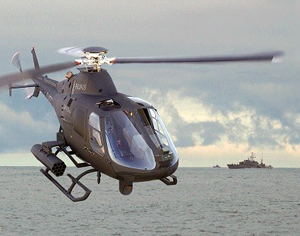SW-4 Solo UAV

Photo: PZL-Świdnik
SOLO is a single engine rotary wing Unmanned Air System/Optionally Piloted Helicopter (RUAS/OPH) first unveiled in 2012 at the MSPO exhibition and based on the manned SW-4. The UAS, built by PZL-Świdnik SA and AgustaWestland company is designed for intelligence, surveillance and reconnaissance missions and cargo re-supply at sea. In 2013, the UK Ministry of Defense awarded AgustaWestland a £2.3 million contract to study the SOLO as a candidate for the Royal Navy's RWUAS (Rotary Wing Unmanned Air System) Capability Concept Demonstrator (CCD) program.
Latest News
SW-4 Solo Unmanned Helicopter Trials Completed
20 September 2015 - Finmeccanica AgustaWestland has announced completion of the U.K. Ministry of Defence’s (MoD) Rotary Wing Unmanned Aerial System (RWUAS) Capability Concept Demonstration (CCD) contract it was awarded in 2013, including 27 hours of demonstration flying and 22 automatic simulated deck landings using its SW-4 RUAS Solo technology demonstrator.
The flying element of the contract was carried out at Llanbedr Airfield in late May 2015 and included demonstrating the operability of a RWUAS, pseudo deck landings and various mission capabilities.
Phase I operability demonstrations included launch and recovery, mission management, mission system integration with the DNA(2) Ship Combat Management System and degraded operations. Phase II included a series of pseudo deck landings being made by the SW-4 RUAS Solo in automated mode onto a towed trailer that replicated the deck of a frigate. Phase III included the demonstration of maritime security and littoral reconnaissance missions utilising the mission sensors to identify various targets of interest. During the demonstration the SW-4 RUAS Solo helicopter was flown as an Unmanned Air System under automatic control from a ground station with a safety pilot onboard.
The Royal Navy’s Commander Maritime Capability (Aviation), Cdr Bow Wheaton, said “We are very pleased with the outcome of the Rotary Wing UAS demonstration project and have learnt a lot that will inform future options. Rotary Wing UAS offer a niche combination of endurance and payload, whilst being able to launch and recover from relatively small warships with a flight deck.”
Under the capability study element of the RWUAS CCD a range of rotorcraft size options have been investigated that could deliver persistent maritime capability. The project also investigated the concept of a rotorcraft system that could provide mine hunting, hydrographic survey and airborne surveillance capability with the ability to operate from a frigate size ship.
Finmeccanica-AgustaWestland as prime contractor brought together an industry team with specialist expertise, comprising Atlas Elektronik UK for mine countermeasures, BAE Systems for surface ship combat management systems, Pelydryn Ltd for airborne hydrographic surveying and Finmeccanica-Selex ES for surveillance sensors.
The SW-4 Solo RUAS/OPH, based on the proven PZL-Swidnik SW-4 light single-engine helicopter, has been designed for both unmanned and piloted operations, providing users with maximum operational flexibility. It has been developed as a result of close cooperation between AgustaWestland and its subsidiary, PZL-Swidnik in Poland. The RUAS version of the SW-4 is capable of performing a number of roles, including intelligence, surveillance and reconnaissance, as well as cargo re-supply. In piloted configuration, the SW-4 can undertake a number of activities, including transportation of personnel, surveillance and intervention. It can be fitted with a comprehensive mission equipment package including search and communications/intelligence systems.
In 2014 Finmeccanica – AgustaWestland completed a demonstration of its Rotorcraft Unmanned Aerial System / Optionally Piloted Helicopter (RUAS/OPH) to the Italian Ministry of Defence. The trials were conducted to evaluate unmanned rotorcraft technology and its potential to provide enhanced capabilities for the Italian armed forces in the future. Recently the SW-4 Solo performed successfully during the European Defense Agency ‘Italian Blade’ Exercise, demonstrating its ISTAR mission, manned-unmanned teaming and data dissemination capabilities.